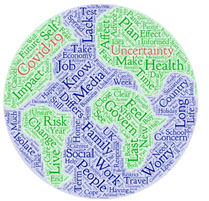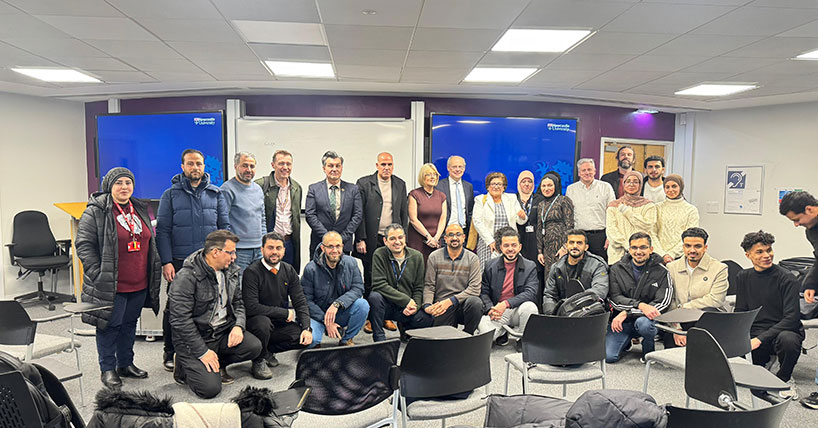COVID-19 links between uncertainty and anxiety
Study aims to explore the links between uncertainty and anxiety
Published on: 14 May 2020
Newcastle University researchers are seeking volunteers to take part in a psychological study into uncertainty in relation to Coronavirus (COVID-19).
Extraordinary. Unprecedented. Uncertain.
Words that are taking on new and greater significance as each successive day of the Coronavirus pandemic unfolds. Ministers and health officials believe that social distancing measures may be helping to limit the spread of the virus. But, they are uncertain.
There are stark warnings, too, that it is uncertain whether the NHS, facing the peak of the virus over the next week or so, will be able to cope. It’s uncertain for just how long the nation’s lockdown will need to be in force. The financial markets are uncertain, and businesses are uncertain about their future.
For individuals, it is difficult to face so many uncertainties. Such as their own health, and that of loved ones, and the short- and long-term impact of the crisis.
In these extraordinary, unprecedented times there are so many ‘unknowns’.
The presence of which might influence the spread of uncertainty-related distress through society.
This global climate of uncertainty has led Newcastle University Professor Mark Freeston, an expert in Generalized Anxiety Disorder, to bring together an international team of researchers.
Their mission is to study the relationship between uncertainty and distress in the context of COVID-19.

The Uncertainty in Coronavirus Research Network
The Uncertainty in Coronavirus Research Network (UNiCORN) includes:
- Drs Lauren Mawn and Ashley Tiplady, Clinical Psychologists with Newcastle upon Tyne Hospitals NHS Foundation Trust
- Dr Gioia Bottesi a Clinical Psychologist at the University of Padova in Italy
- Dr Sarah Thwaites, from Newcastle University’s School of Psychology
- Dr Jinrui Pan, a behavioural economist from Durham University
- Drs Pablo Romero Sanchiz and Raquel Nogueira from Dalhousie University in Canada and the University of Malaga in Spain
- Dr Gregoris Simos at the University of Macedonia, Greece
"It is well known that, within worry and anxiety, people’s ability to tolerate uncertainty is often an important factor", says Professor Freeston. "We know that worry and anxiety lie on a continuum; people who report low or average levels of anxiety can experience similar thoughts and behaviours to those who are more severely affected."
"COVID-19 offers a unique context within which we can attempt to learn more about the relationship between uncertainty, anxiety and how people respond when they are feeling uncertain", he said.
Professor Freeston adds: "The data collected will also allow us to map location and track people’s data against publically available statistics about coronavirus and the local situation. In turn, that enables us to consider dynamic geographical tracking over time.
"This is important because it allows us to consider influences on distress or uncertainty as information becomes more or less clear across the world."
Innovative and timely research
‘Importantly, this innovative and timely research will inform how best to help people to cope with and tolerate situations of uncertainty, something which not only has implications in mental health but also in considering how we should respond to events like the pandemic’, says Dr Mawn.
‘Our aim is to find out more about whether people’s ability to tolerate uncertainty is related to the experiences they have and their behaviour, so we are interested in everybody's responses’, she added.
The study has gained already significant interest from the UK research community. Last week (6 April), UNiCORN’s project updates were the most widely read updates on scientific and research social networking site, ResearchGate.
The team hope to publish their findings from the study in August 2020.
Take part
The study is currently available in three languages – English, Spanish and Italian. You can take part in the study and circulate it via your networks by sharing the links below
- English: An invitation to take part in a psychological study into uncertainty and distress in Coronavirus
- Spanish: Invitación a participar en un estudio psicológico sobre la incertidumbre asociada al Coronavirus
- Italian: Invito a partecipare a uno studio psicologico sull’incertezza associata al Coronavirus
Follow developments on Twitter @Covid19Study or on ResearchGate: ‘Towards a model of uncertainty distress in the context of Coronavirus (COVID-19)’.
To find out more about the study, or to contact the research team, please contact intolerance.uncertainty@newcastle.ac.uk



